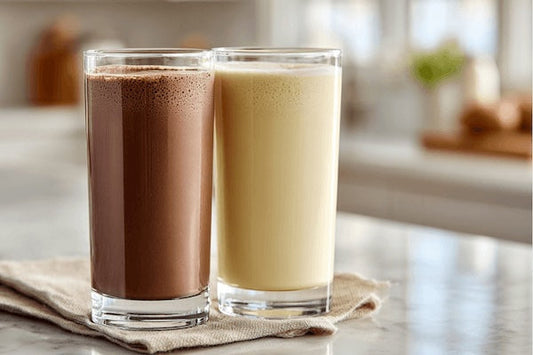Vitamins for Menopause Fatigue: Natural Remedies to Boost Your Energy
Menopause can bring unwelcome fatigue that affects your mood, focus, and daily vitality. If you’re wondering which vitamins relieve menopause fatigue, you’re not alone. Understanding the best vitamins for menopause fatigue—alongside diet, exercise, and sleep—can help you regain energy naturally.
Table of Contents
- Key Takeaways
- 1. Vitamin D for Menopause Fatigue
- 2. B-Vitamins: The Energy Complex
- 3. Iron & Menopause Fatigue
- 4. Magnesium: Muscle Relaxation & Sleep Support
- Meal Replacements: Convenient Multivitamin Delivery
- Lifestyle Strategies to Enhance Vitamin Effectiveness
- Frequently Asked Questions
- How much vitamin D should I take for menopause fatigue?
- Can I get enough B vitamins from food alone?
- Are there risks to taking too much iron?
- What’s the best time to take magnesium?
- Do I need to consult a doctor before starting supplements?
- Next Steps
Key Takeaways
- Vitamin D, B-Complex, Iron, and Magnesium are essential vitamins for menopause fatigue that support energy production, bone health, and mood stability.
- Food sources and dosage guidelines ensure safe, effective intake of these nutrients.
- Lifestyle habits—balanced diet, regular exercise, and quality sleep—amplify the benefits of menopause supplements.
- Consult a healthcare professional before starting any supplement to avoid over-supplementation or drug interactions.
1. Vitamin D for Menopause Fatigue
Why it matters: Vitamin D helps your body absorb calcium, crucial for bone density after menopause as osteoporosis is a real concern. It supports mood regulation and immune function.
- Optimal intake: Aim for 600–800 IU daily, adjusting based on blood test results.
- Food sources: Fatty fish (salmon, mackerel), egg yolks, fortified dairy or plant milks.
- Sun exposure: 10–15 minutes of midday sun (arms and legs) 2–3 times per week.
Pro Tip: Pair vitamin D with calcium-rich foods to enhance absorption.
2. B-Vitamins: The Energy Complex
B-Complex vitamins convert food into energy and support nerve function, making them powerful vitamins for menopause fatigue.
| Vitamin | Role | Food Sources |
|---|---|---|
| B1 (Thiamine) | Carbohydrate metabolism | Whole grains, beans |
| B2 (Riboflavin) | Cellular energy | Yogurt, almonds |
| B3 (Niacin) | DNA repair, circulation | Chicken, mushrooms |
| B5 (Pantothenic acid) | Hormone synthesis | Avocado, eggs |
| B6 (Pyridoxine) | Mood regulation, brain health | Bananas, chickpeas |
| B12 (Cobalamin) | Red blood cell formation | Meat, fortified cereals |
- Supplement tip: Consider a B-Complex capsule that provides 100% DV of each B-vitamin.
- Brain fog relief: Vitamins B6 and B12 support neurotransmitter function for clearer thinking.
3. Iron & Menopause Fatigue
Why iron matters: Iron transports oxygen in your blood; low levels can lead to anemia and persistent tiredness.
- Dosage: Women aged 51+ generally need 8 mg/day from food; supplements only if a blood test indicates deficiency.
- Food sources: Red meat, spinach, lentils, fortified cereals.
- Tip: Consume iron with vitamin C–rich foods (e.g., bell peppers, citrus) to boost absorption.
4. Magnesium: Muscle Relaxation & Sleep Support
Magnesium helps regulate muscle and nerve function, supports bone health, and promotes relaxation for quality sleep. Muscle helps to balance metabolism. Nutritionists recommend 1.2g-2g of protein for every kg of body weight for women in menopause depending on how active they are and if they strength train.
- Recommended intake: 320 mg/day for women over 50.
- Food sources: Almonds, spinach, whole grains.
- Sleep aid: Take in the evening to ease tension and improve sleep onset.
Meal Replacements: Convenient Multivitamin Delivery
Meal replacement shakes such as Eve Biology are formulated with multivitamins to offer a convenient, well-balanced way to address nutrient gaps in your diet. Because a multivitamin blend is calibrated for optimal absorption, the vitamins are less likely to compete for uptake, and you also benefit from balanced macronutrients and fibre that support steady blood sugar levels.
- Enhanced absorption: Nutrients paired with co-factors ensure maximal bioavailability.
- Balanced formula: Avoids high-dose spikes and antagonistic interactions.
- Convenience factor: Perfect for busy mornings or on-the-go nutrition.
- Success in reducing menopause fatigue - Eve Biology consumer trials demonstrated an 88% improvement in menopause fatigue.
Lifestyle Strategies to Enhance Vitamin Effectiveness
Embrace a Balanced Diet
Fill half your plate with vegetables, add lean protein and whole grains. A variety of colors ensures a spectrum of micronutrients.
Regular Exercise
Combine aerobic, strength, and balance training 3–5 times per week to boost circulation, mood, and bone health.
Quality Sleep
Maintain a consistent sleep schedule, limit screens before bed, and create a calming bedtime routine for restorative rest.
Frequently Asked Questions
How much vitamin D should I take for menopause fatigue?
Most women benefit from 600–800 IU/day, but blood tests allow precise dosing based on your levels.
Can I get enough B vitamins from food alone?
A varied diet often suffices, but supplements can fill gaps—especially for B12 on plant-based diets.
Are there risks to taking too much iron?
Yes. Excess iron (above 45 mg/day) can cause gastrointestinal issues and oxidative stress—supplement only if deficient.
What’s the best time to take magnesium?
Evening, for its calming effect on muscles and nerves, supporting restful sleep.
Do I need to consult a doctor before starting supplements?
Absolutely. Blood tests and medication reviews ensure safe, tailored supplementation.
Next Steps
- Read The Nutritonists Guide To The Menopause Diet
- Take A Look at Eve Biology's Rebalancing Shake Starter Pack







